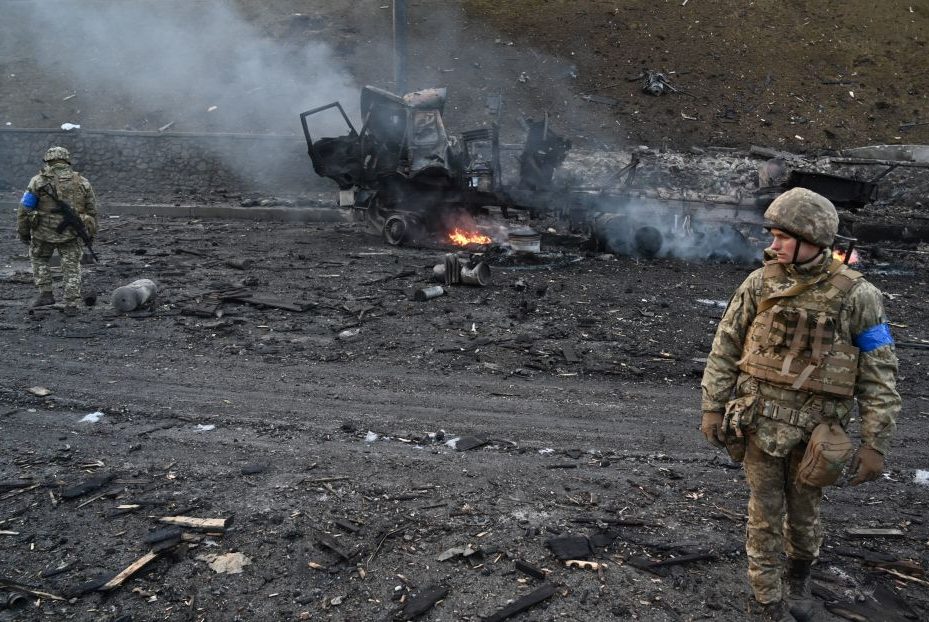Preparing for the next phase in the Ukrainian conflict
Posted By Andrew Heiner on March 1, 2022 @ 13:10

As 2021 drew to a close, the prospect of a full-scale war in Europe appeared unlikely to most, if not unfathomable.
What a difference two months can make.
Russian President Vladimir Putin’s decision to invade Ukraine has set in motion an urban conflict between Europe’s two largest states the likes of which has not been seen since World War II.
The stakes are astronomically high. Putin has now placed Russia’s strategic nuclear forces on ‘special alert’ and warned Sweden and Finland that any attempt they may make to join NATO will be met with ‘serious military repercussions’. These are ominous signs, likely confirming that Russia’s invasion is not so much an isolated incident of great-power aggression but rather an attempt to agitate for major strategic realignment and the creation of a new geopolitical paradigm.
Today, as fighting rages across Ukraine’s besieged metropolitan centres, it is right for us to consider what form the next phase of the conflict may take. In the absence of more substantive peace talks, it appears likely that we’ll see the war in Ukraine shift gears over the coming weeks and transition to a more protracted, asymmetric campaign of armed resistance. This assumes that Russia will be willing to resort to the use of indiscriminate force and/or non-conventional weapons if necessary in order to enter and occupy Ukraine’s key cities.
It’s important that Western observers fully understand not only that a prolonged insurgency is likely on the cards in Ukraine, but the reasons for this.
Ukraine is a sizeable nation of 44 million people with 500,000 veterans who have gained direct combat experience as a result of the recent simmering separatist tensions in the country’s east. While in Lviv in October 2019, I was struck by the sight of transiting troops choking platforms at the city’s main railway station. The reality is that Ukraine has been fighting a near-total war—and doing so alone—for the better part of a decade.
As a result, the country is well reconciled to the horrors of modern conflict and it was fully aware before last week that Western intervention could not be relied upon in the event of a full-scale Russian invasion. These core realities have contributed to a high level of preparedness and self-sufficiency on the part of the Ukrainian state, and there is every reason to believe that Ukrainians will retain the ability to wage a protracted campaign of armed resistance in the coming months even once their Territorial Defence Forces are ultimately dispersed by overwhelming Russian firepower.
The question then becomes, will Ukrainians have a desire to fight on, even once their urban centres begin falling into Russian hands? For the reasons outlined below, the answer is surely ‘yes’.
Although Putin has rightly pointed out that Ukrainian statehood is a relatively novel concept, the galvanising effect that the 2014 conflict has had on Ukraine’s nascent national identity in the space of a few short years must not be underestimated. The defence of Donetsk airport by Ukrainian ‘cyborg’ forces in 2014 and 2015, and the defiant acts of protesters at Kyiv’s Independence Square during the Maidan Revolution in particular, have served to solidify Ukraine’s independent national ethos and turn the tide of public opinion firmly against Russia.
My time in Kyiv in 2019 highlighted just how much Ukraine has changed since the removal of Russian-backed president Viktor Yanukovych in 2014. In short, there is now simply no going back for Ukraine. As a young democracy, it is keen to move forward with its new-found national identity—an identity that permeates every aspect of national life from museum exhibitions to pop culture and urban design.
Ukraine will not allow its future to be predetermined by its Soviet past. And while the country’s sense of self has indeed been forged more recently than that of neighbours such as Poland, its new identity has one major advantage in the current crisis—it is defined and framed almost exclusively in terms of Kyiv’s opposition to and rejection of Moscow. The recreation of Ukraine’s union with Russia is now seen as fundamentally incompatible with the views of most Ukrainians and, for better or worse, the country’s citizens are likely willing to make that fact known through a prolonged and costly resistance.
The apparent willingness of the international community to provide effective assistance to Ukraine is the final factor that will likely help sustain a possible insurgency against Russian occupation. Promises of lethal aid for Ukraine continue to stream in from the US, UK, France, Germany, the Netherlands and Australia, crushing Russian hopes of a speedy resolution to the war.
Berlin’s seismic decision to break from its longstanding prohibition on the export of lethal aid speaks to the seriousness of the security crisis currently enveloping Europe. UK Foreign Secretary Liz Truss’s decision to publicly support UK nationals who travel abroad to fight as part of Ukraine’s ‘foreign legion’ is also an extraordinary and unprecedented measure. A predicted flow of irregular foreign fighters moving into Ukraine will only serve to further stymie Russian efforts to occupy the country.
The world has rightly been captivated by the defiance and tenacity of Ukraine’s armed forces this week, and Russia’s failure to accomplish any of its first-day invasion objectives is testament to the courage of Ukraine’s service men and women.
However, we must steel ourselves for the likelihood of a brutal and contested occupation of Ukraine in the months ahead—an occupation that has the potential to take a truly horrific human toll. We must not place the next phase of this conflict out of mind simply because we don’t like where things may be headed.
Article printed from The Strategist: https://www.aspistrategist.org.au
URL to article: https://www.aspistrategist.org.au/preparing-for-the-next-phase-in-the-ukrainian-conflict/
Click here to print.